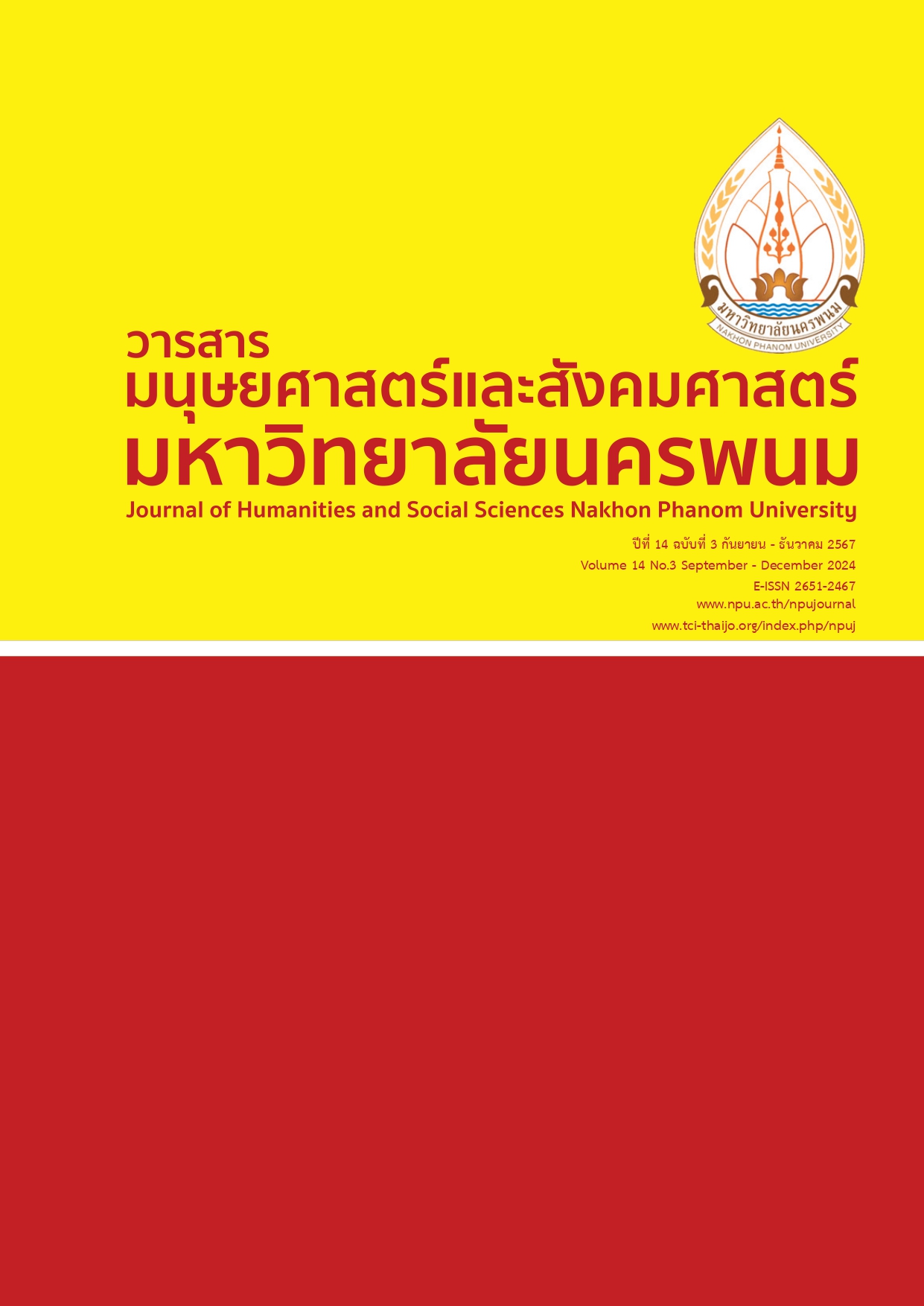The Effect of The Psychological Contract on Job Satisfaction and Job Performance
Main Article Content
Abstract
This research aims to study the relationship and impact of psychological contracts on job satisfaction, the impact of job satisfaction on job performance, and the effect of effective human resource management on psychological contracts as well as job satisfaction. In addition, this research also studies the mediating role of psychological contract toward the relationship between effective human resource management and job satisfaction, as well as between effective supervision and job satisfaction. This research was quantitative, using a questionnaire as a tool to collect data from 200 employees from various companies using non-probability sampling method, including convenience sampling. Inferential statistics were analyzed using structural equation modeling (SEM), the analysis of model fit, and the analysis of direct and indirect standard coefficient effects. The findings revealed that: 1) The psychological contract affected job satisfaction. 2) The job satisfaction had an impact on job performance. 3) There is no impact of effective human resource management on psychological contracts. 4) The psychological contract was not a variable mediator in the relationship between effective human resource management and job satisfaction. 5) The psychological contract a complete mediator in the relationship between effective supervision and job satisfaction.
Article Details

This work is licensed under a Creative Commons Attribution-NonCommercial-NoDerivatives 4.0 International License.
References
Appman (2024). 5 Challenges for HR in 2024. Retrieved May 2024, from https://www.appman.co.th/5-challenges-for-hr-in-2024/
Armstrong, M. &Taylor, S. (2014). Armstrong's Handbook of Human Resource Management Practice: Edition 13. United Kingdom ; Kogan page.
Azim, A. M. M., Hassan, M. S., Zaid, D. S. & Daud, M. A. (2020). The influence of supervisor support, organizational trust on workplace deviant behavior: Do psychological contract matter?. International Journal of Academic Research in Business and Social Sciences, 10(2),116-132. doi:10.6007/ijarbss/ v10-i2/6895
Campbell, J. P. (1990). Modeling the performance prediction problem in industrial and organizational psychology. In M. D. Dunnette (Ed.), Handbook of industrial and organizational psychology, (Vol. 1, pp. 687-732). Palo Alto, CA, US : Consulting Psychologists Press, xxvii.
Cascio, W. F. (2006). The Economic Impact of Employee Behaviors on Organizational Performance. In E. E. Lawler & J. O’Toole (Eds.), America at Work: Choices and Challenges (pp. 241-256). New York : Palgrave Macmillan US.
Collier, J. E. (2020). Applied structural equation modeling using Amos: Basic to advanced techniques. London, England : Routledge.
Conway, N. & Briner, R. B. (2005). Understanding psychological contracts at work: A critical evaluation of theory and research. United Kingdom : Oxford University Press.
Fornell, C. & Larcker, D. F. (1981). Structural equation models with unobservable variables and measurement error: Algebra and statistics. JMR, Journal of Marketing Research, 18(3),382-388. doi:10.2307/3150980
Goetsch, D. L. (2002). Effective Supervision: A Guidebook for Supervisors, Team Leaders, and Work Coaches. US : Prentice Hall.
Guest, D. E., Paauwe, J. & Wright, P. M. (2012). HRM and Performance : Achievements and Challenges. New Jersey : Wiley.
Hair, J. F., Risher, J. J., Sarstedt, M. & Ringle, C. M. (2019). When to use and how to report the results of PLS-SEM. European Business Review, 31(1),2-24. doi:10.1108/ebr-11-2018-0203
Karani, A., Trivedi, P. & Thanki, H. (2022). Psychological contract and work outcomes during COVID-19 pandemic. Journal of Organizational Effectiveness People and Performance, 9(1),149-168. doi:10. 1108/joepp-09-2020-0186
Kutaula, S., Gillani, A. & Budhwar, P. S. (2020). An analysis of employment relationships in Asia using psychological contract theory: A review and research agenda. Human Resource Management Review, 30(4),100707. doi:10.1016/j.hrmr.2019.100707
Loan, L. (2020). The influence of organizational commitment on employees’ job performance: The mediating role of job satisfaction. Management Science Letters, 10(14),3307-3312. doi:10.5267/j.msl.2020.6.007
Locke, E. A. (1976). The nature and causes of job satisfaction. In M. D. Dunnette (Ed.), Handbook of industrial and organizational psychology (pp. 1297-1343). Chicago, IL : Rand McNally.
Northouse, P. G. (2018). Leadership: Theory and practice. Thousand Oaks, CA : SAGE Publications.
Putsom, W., Suwannarat, P. & Songsrirote, N., (2019). The Effect of Entrepreneurial Leadership, Value Creation and Automotive Parts Manufacturing Businesses Performance in Thailand. Human Resource and Organization Development Journal, 11(2), 1-33.
Reizer, A., Brender-Ilan, Y. & Sheaffer, Z. (2019). Employee motivation, emotions, and performance: a longitudinal diary study. Journal of Managerial Psychology, 34(6),415-428. doi:10.1108/jmp-07-2018-0299
Robbins, S. P. & Judge, T. A. (2017). Organizational Behavior. UK : Pearson.
Roehl, M. T. (2019). The impact of SHRM on the psychological contract of employees: A typology and research agenda. Personnel Review, 48(6),1580-1595. doi:10.1108/pr-02-2018-0063
Rousseau, D. (1995). Psychological contracts in organizations: Understanding written and unwritten agreements. New Delhi, India : SAGE.
Spector, P. E. (1997). Job satisfaction: Application, assessment, causes, and consequences. New Delhi, India : SAGE.
Suwannarat, P. (2021). International Business Management: A Cross-cultural Perspective (4th ed.). Bangkok : AAA Service Printing House.
Suwannarat, P. (2023a). The Moderating Role of Trust in Influencing the Effectiveness of Export Incentives of Exporters in the ASEAN, Journal of Asia Business Studies, 17(2),279-307.
Suwannarat, P. (2023b). Underst : anding the Difference of Values-based Motivation of Managerial Workers in Spa Businesses in Thailand, International Journal of Emerging Markets, 18(2),483-504.
Tabachnick, B. G. & Fidell, L. S. (2001) Using Multivariate Statistics. (4th ed.). Boston : Allyn and Bacon.
Weiss, D. J. (1967). Manual for the Minnesota Satisfaction Questionnaire: Work Adjustment Project, Industrial Relations Center, US : University of Minnesota.
Yukl, G. A. (2013). Leadership in organizations. Old Tappan, NJ : Prentice Hall.


